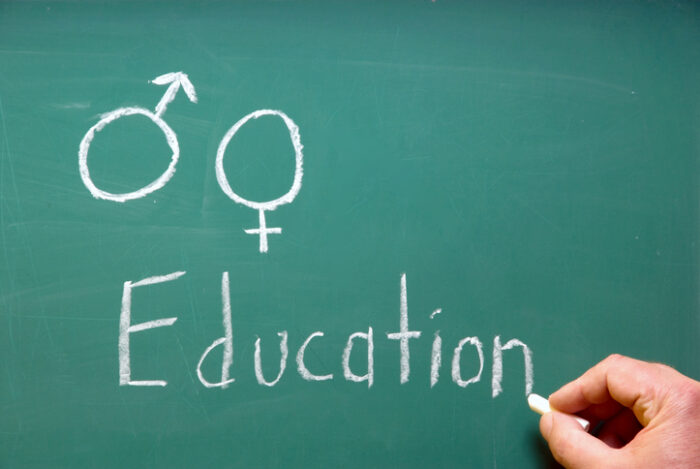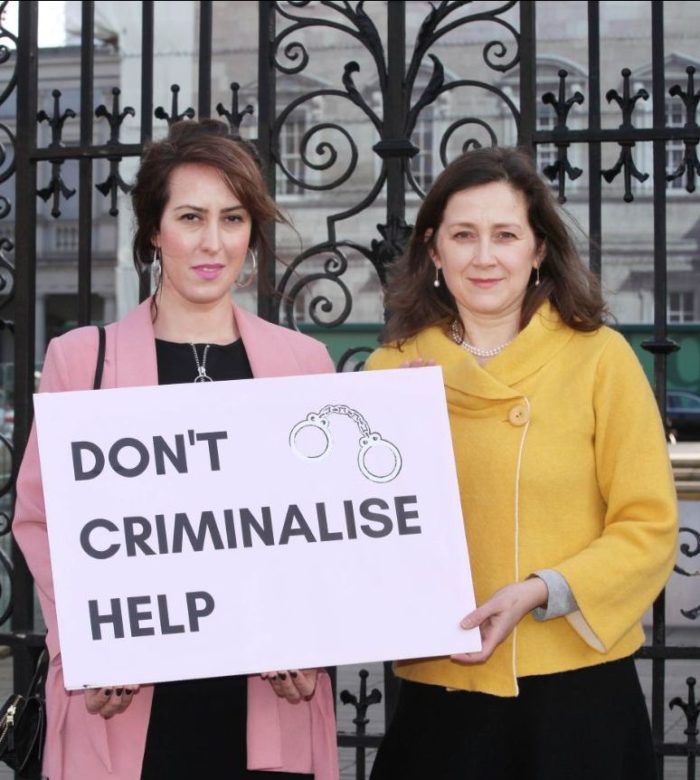
Persecuted Christian minorities have requested that their plight not be singled out for special mention, the Minister for Foreign Affairs, Simon Coveney has said.
He added that this is why the Government doesn’t specifically condemn the persecution of Christians.
While calling the persecution of Christians and other minorities in the Middle East and North Africa “a deeply disturbing matter”, he noted how Ireland “most often expresses these concerns in [terms] applicable to all minorities, rather than particular ones.”
This, he said, in many cases was at the request of “local Christian and other minority representatives.” It was the case that “explicit messages of support from western countries only expose them further to the (unjust) accusation that their communities are somehow legacies of or agents for western intervention in the region,” he said.
He was responding to a letter from Senator Neale Richmond about the persecution of Christians in the Middle East and North Africa.

Additional childcare subsidies for parents in work or education are being sought by Children’s Minister Katherine Zappone in the upcoming budget.
The proposals include nothing for parents who take care of their children in the home.
The National Childcare Scheme (NCS) sees parents who are working or in education eligible for targeted subsidised childcare. The sums vary depending on income level and the child’s age, but parents can apply for as much as 40 hours of childcare per week.
It is understood Ms Zappone’s Budget proposals include:
Extending the number of hours available to up to 45 hours from September 2020;
Increasing after-school childcare hours from 17 to 22 hours per week;
Adding five hours to the 15 currently on offer to parents who are seeking employment.
The NCS that kicks in at the end of October sees a parent qualify for up to 40 hours a week in subsidies if they and their partner are working, studying or transitioning between work and study. The definition of work includes apprenticeships, part-time and people on zero-hours contracts. Study includes any education or training programme on the National Framework of Qualifications.

Consent classes are to be rolled out to secondary schools and sports clubs across the country.
The Smart Consent workshops had been originally developed for college campuses by Pádraig MacNeela and Siobhán O’Higgins, from NUIG’s School of Psychology. The programme has now been adapted to suit the age profile of school students.
The programme will be launched in schools in early 2020. However, several schools have already had the workshop.
All sexual orientations and gender identities are included, as is the role of alcohol and drugs in consent.
The organisers say they now plan to work with various networks and groups to reach young people aged between 16 and 24 years old through third level, second level and sports clubs too.
Caroline West, a lecturer and researcher in sexuality studies at DCU, had facilitated these workshops at third level and welcomes the news that they will be rolled out to even younger ages.
“As someone who’s facilitated this class at third level I sometimes feel it’s too late,” she said. “We need to talk to a younger age. People are already having sex before they come to university and assaults have already occurred. If we have the conversation earlier, then consent is normalised.”

Voters are more vulnerable to believing fake news stories if they match their own personal worldviews or ideologies, according to a new University College Cork study analysing the 2018 Eighth Amendment vote.
It found that people are 14 times more likely to claim they remember a fake story if it matches their own beliefs.
The study, by University College Cork’s Dr Gillian Murphy, was one of the largest of its kind ever carried out in Ireland.
With concerns about fake news growing, the research suggests that everyone is susceptible to false news stories – especially if they appeal to pre-existing beliefs.
The research, which took place in the weeks leading up to voting day, used the 2018 referendum to find out how likely people were to believe and “remember” fake stories.
“The implications for upcoming elections are that voters are vulnerable to not just believing a fake news story, but falsely recalling that the event truly happened,” Murphy said.
“Warnings don’t seem to help and so we need to develop new strategies to combat this problem,” she added.

A liberal secular worldview is attempting to dominate and suppress the Christian worldview.
That’s according to the Bishop of Cloyne, William Crean.
Speaking on the celebration of the centenary of the dedication of Saint Colman’s Cathedral in Cobh, Bishop Crean reflected on Ireland today: “In the north of Ireland, the ancient divisions have eluded resolution. In the south a liberal secular worldview seeks to suppress the Christian narrative”.
The bishop also said he welcomes the prospect of a new Church-State covenant.
“Too often the Church’s involvement is represented as an exercise in control and indoctrination. Judging by the recent decades it has failed miserably,” he said.
He added that the Church’s goal is one of service to humanity through its understanding of the human persons unique dignity before God. “It is in that spirit that those of us in leadership wish to go forward. Not to control but to serve”.
Specifically in regards to end of life issues, he said it is “alarming when bizarre and extreme violence ceases to shock us or when suicide is perceived as acceptable and almost normal”.
“Equally is it not disconcerting when euthanasia is seen as a positive option? In making these observations I am deeply conscious of the pain and loss of the families involved. My concern is to raise the question about the nature of the society we are creating which we are keen to describe as modern and progressive.”

The Catholic Archbishop of Dublin, Diarmuid Martin, has said schools’ divestment policy has failed and he has questioned the depth of the desire for change.
Speaking to The Irish Times on Sunday, Archbishop Martin recalled how last month in Dublin Castle – at a meeting between the Government, leaders of Ireland’s churches, other faiths, and various ethical groupings – he told the Taoiseach that the policy on divestment of schools’ boards of management had failed. “The answer I got was that he was only trying to blame the methods for the fact that it hasn’t worked. I didn’t say that we should give up on it.”
The Archbishop further recalled how “the Taoiseach said to me on another occasion there were many other local factors. I suggested the only way to do it was to have some sort of figure or a group of people who went and looked at it.
“Way back when Batt O’Keeffe was minister for education (from 2008 to 2010), I said that probably one of the best ways to do this was to get schools in areas and say that over the lifetime of this grouping the school will change. If you’ve got junior and senior [classes] the lifetime would be only two or three years and that you would have the idea that they would gradually change in ethos rather than have to do it overnight.”
More generally, the archbishop said he felt that while the topic of divestment was “a lively issue in general reflection, I’m not too sure on doorsteps, I’m not too sure that many people are asking for it, because if people are happy with their school they are happy with their school.”

Eight churches have been sealed across Algeria over the past 21 months.
It comes after the launch of a government campaign in 2017 to close Christian places of worship and other Christian institutions.
The government requires buildings to obtain a license, permitting them to engage in non-Muslim religious worship, but has refused to issue any since the law was instated in 2006.
As a result, it has become standard practice for churches in the region to rent premises and inform local authorities of their activities.
Five churches have been sealed by authorities for not having licenses, following visits from building safety committees.
Freedom charity Middle Eastern Concern (MEC) have also reported that at least three churches have been ordered to cease all Christian activities.
Parishioners are concerned that their freedoms will continue to be threatened and MEC are urging believers to join them in praying for “the Lord’s peace, wisdom and guidance” for EPA and church leaders and for an end to the persecution faced by the Christian community at the hands of the authorities.
They are also calling for the regulations governing non-Muslim worship to be amended to allow Christians to worship freely.

Parents will have the option of removing their children from sex-ed classes in the state of Ontario as the province rolls out a new curriculum that moves topics of gender identity and gender expression to later grades, Ontario’s Education Minister says.
The revised health and physical education curriculum, released on Wednesday, includes a provision that gives families three weeks notice of when sex-ed lessons will be taught, and up to five school days before the class to provide school boards with an exemption notice for their children.
Under a previous plan, an opt-out process was available, but some boards, including the Toronto District School Board and the Peel District School Board, would not entertain requests to let students miss classes about sexual orientation, gender identity or similar issues because those areas are protected under the human-rights code.
“We do believe that parents have an important say in some of the more sensitive issues and subject matters that get taught to their children,” Education Minister Stephen Lecce said in an interview on Tuesday. He added later: “The overwhelming [number] of parents in this province want their kids to learn a modern curriculum that teaches respect and embraces the principles that define this nation. And I think we do that in this curriculum. But we also ensure that parents have a say.”
Several provinces, including British Colombia and Alberta, also have an opt-out process for sex-ed lessons.

Newly released figures confirm that churches are being attacked almost every second day in the North of Ireland.
Christian Action Research and Education (CARE) NI said there were 445 recorded cases of criminal damage in the past three years, according to figures that came from the Police Service of Northern Ireland (PSNI).
The attacks have hit religious buildings, churchyards and cemeteries and have happened in every one of Northern Ireland’s 11 policing districts.
The charity has called on political parties to help set up a fund for extra security for churches and other religious buildings, similar to a scheme that already exists in England and Wales.
Created in July 2016, the places of worship (POW) protective security funding scheme provides financial resources to religious organisations, helping them buy security measures such as CCTV, fencing and lighting.
Dr Alistair McCracken, clerk of session at Saintfield Road Presbyterian Church, said he would support any government measures to protect churches.

The UK Court of Appeal has upheld an exclusion zone outside of an abortion centre in Ealing, London. The appellant, Alina Dulgheriu, has said she will appeal to the Supreme Court. In Ireland, plans to introduce such zones outside all abortion facilities have stalled for now.
The Court found that the appellant’s rights to assembly, religion, thought, expression and the reception of information were violated by the Ealing Public Space Protection Order (PSPO). Nevertheless they ruled that such violations were justified because of the right to privacy of Marie Stopes attendees not to be seen in public.
Alina Dulgheriu, a mother who herself had been helped by a local vigil, unsuccessfully challenged the order at the High Court last July after Ealing Council introduced an exclusion zone around the Marie Stopes abortion centre. Pro-life critics call them ‘censorship zones’.
Alina said: “My little girl is here today because of the real practical and emotional support that I was given by a group outside a Marie Stopes centre, and I am going to appeal this decision to ensure that women in Ealing and all across the country do not have this vital support option removed.”